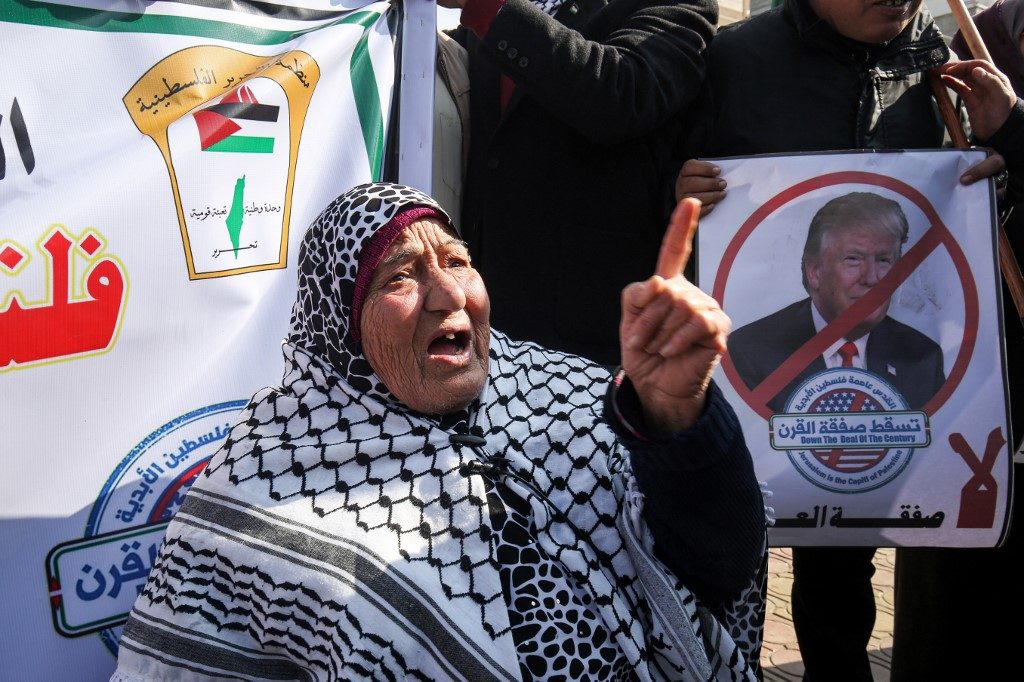SUMMARY
This is AI generated summarization, which may have errors. For context, always refer to the full article.

PARIS, France – US President Donald Trump’s Middle East plan on Tuesday, January 28 prompted a lukewarm response from Europe and the UN, and a furious rebuke from key Muslim countries who denounced it as betrayal of the Palestinians.
Here are some of the reactions from around to the world to the plan, which had already been resoundingly rejected by Palestinian leaders before Trump launched it alongside Israeli Prime Minister Benjamin Netanyahu.
The Palestinian Authority
Palestinian president Mahmud Abbas, who has taken part in previous US-led peace talks with Israel but stayed away Trump’s proposal, vowed that “this conspiracy deal will not pass.”
He pledged to “resist the deal in all its forms” after meeting with various Palestinian factions in the West Bank city of Ramallah. “Our people will take it to the dustbin of history.”
Europe
Top EU diplomat Josep Borrell said the bloc will “study and assess” Trump’s proposals on the basis of its commitment to a “negotiated and viable two-state solution that takes into account the legitimate aspirations of both the Palestinians and the Israelis.”
Germany, the EU’s most powerful player, echoed Borrell’s point by calling for a balanced approach.
“Only a negotiated two-state solution, acceptable to both sides, can lead to a lasting peace between Israelis and Palestinians,” German Foreign Minister Heiko Maas said.
Britain, which is leaving the EU on Friday, January 31 and has long had a special relationship with Washington, gave the warmest reaction.
“This is clearly a serious proposal, reflecting extensive time and effort,” British Foreign Secretary Dominic Raab said in a statement.
Earlier, Prime Minister Boris Johnson spoke to Trump to discuss the plans.
Downing Street said the proposal “could prove a positive step forwards.”
The UN
The United Nations said it remains committed to a two-state solution based on the borders in place before the 1967 war, when Israel seized the West Bank and Gaza.
“The position of the United Nations on the two-state solution has been defined, throughout the years, by relevant Security Council and General Assembly resolutions by which the Secretariat is bound,” said Stephane Dujarric, a spokesman for Secretary-General Antonio Guterres.
Russia
Russia said it would study the plan and called on Israelis and Palestinians to negotiate directly to find a “mutually acceptable compromise.”
Introducing a note of doubt, Deputy Foreign Minister Mikhail Bogdanov said: “We do not know if the American proposal is mutually acceptable or not. We must wait for the reaction of the parties.”
Turkey
Turkey, a strong advocate of the Palestinian cause, condemned the plan.
“The United States’ so-called peace plan is stillborn,” Turkey’s foreign ministry said in a statement. “This is an annexation plan aimed at killing a two-state solution and extorting the Palestinian territory.”
Iran
Iran, which does not recognize Israel and has been in a confrontation with the Trump administration, denounced the plan as a threat to regional stability.
“The shameful peace plan imposed by America on the Palestinians is the treason of the century and doomed to fail”, the Iranian foreign ministry said.
Hezbollah
Lebanon’s Iranian-backed movement Hezbollah, which Washington calls a terrorist group, said the plan represented an attempt to “wipe out the Palestinian people’s rights”, adding that the “shameful move… could not have been made without the complicity and betrayal of a certain number of Arab regimes.”
UAE
The United Arab Emirates, which sent its ambassador to Trump’s announcement alongside Netanyahu despite not recognizing the Jewish state, praised the plan.
“The plan announced today offers an important starting point for a return to negotiations within a US-led international framework,” the UAE embassy in Washington said on Twitter.
Egypt
Egypt called on “the two concerned parties to undertake a careful and thorough examination of the US vision to achieve peace and open channels of dialogue.”
The foreign ministry added that negotiations should aim for “a comprehensive and just peace and the establishment of an independent Palestinian state.”
Jordan
Jordan’s foreign ministry said that an independent Palestinian state based on pre-1967 borders was “the only path to a comprehensive and lasting peace.”
Saudi Arabia
Saudi’s foreign ministry said it “appreciates” Trump’s efforts and called for the start of direct talks between Israel and the Palestinians.
Any disagreements with the plan should be resolved through negotiations under the auspices of the United States, it said,
Saudi King Salman meanwhile stressed “the kingdom’s steadfast stance on the Palestinian issue and the rights of the Palestinian people.” – Rappler.com
Add a comment
How does this make you feel?
There are no comments yet. Add your comment to start the conversation.